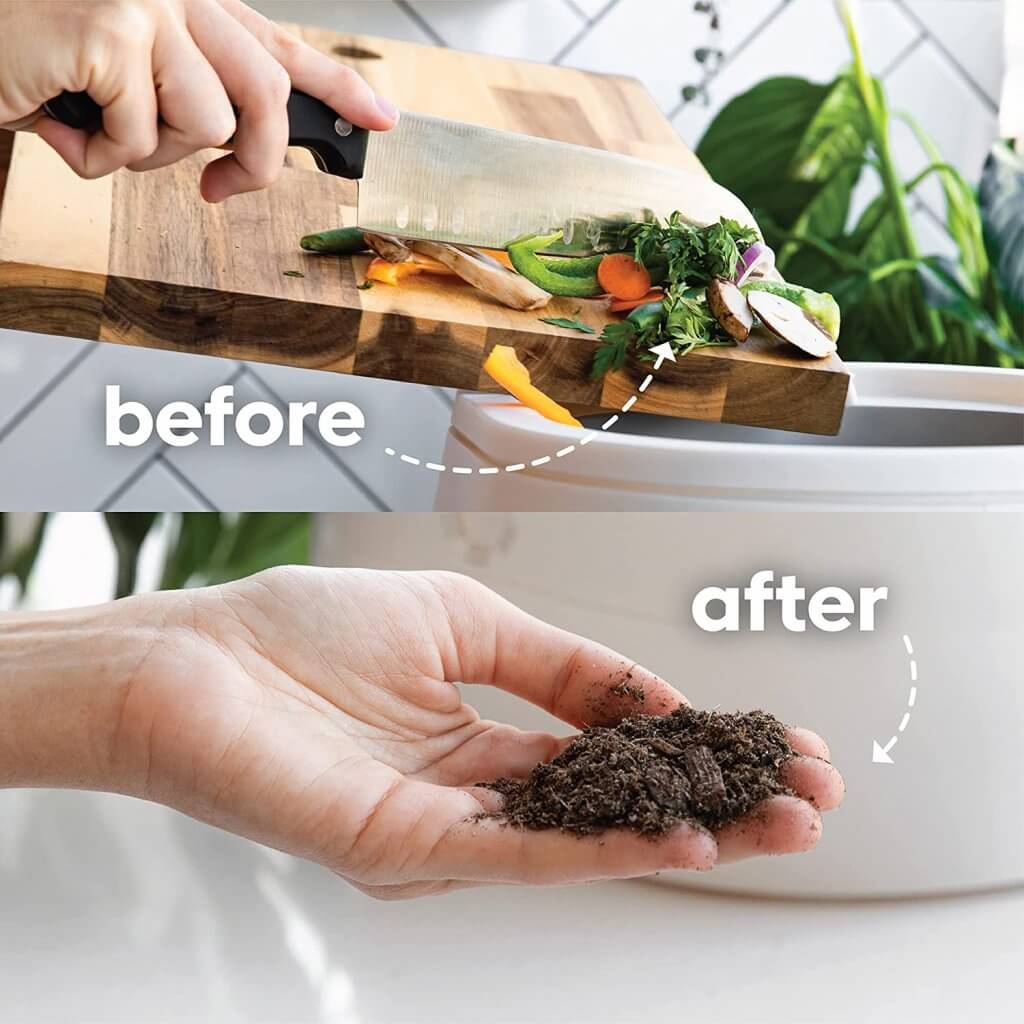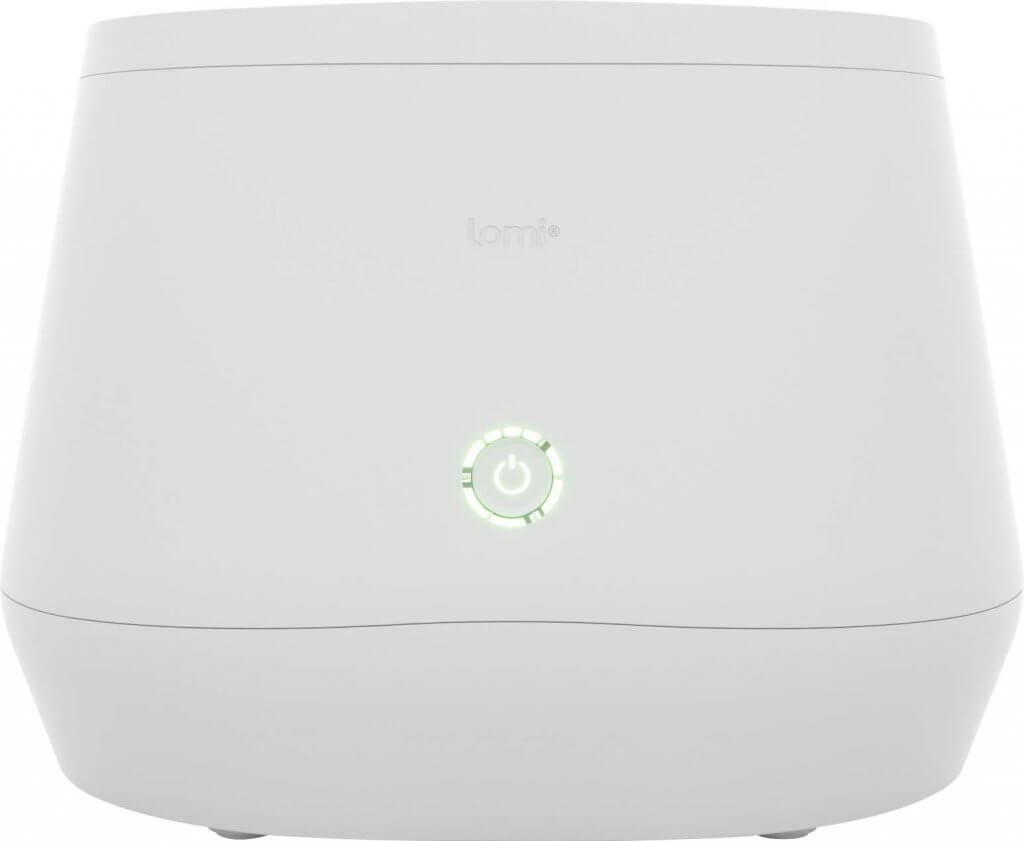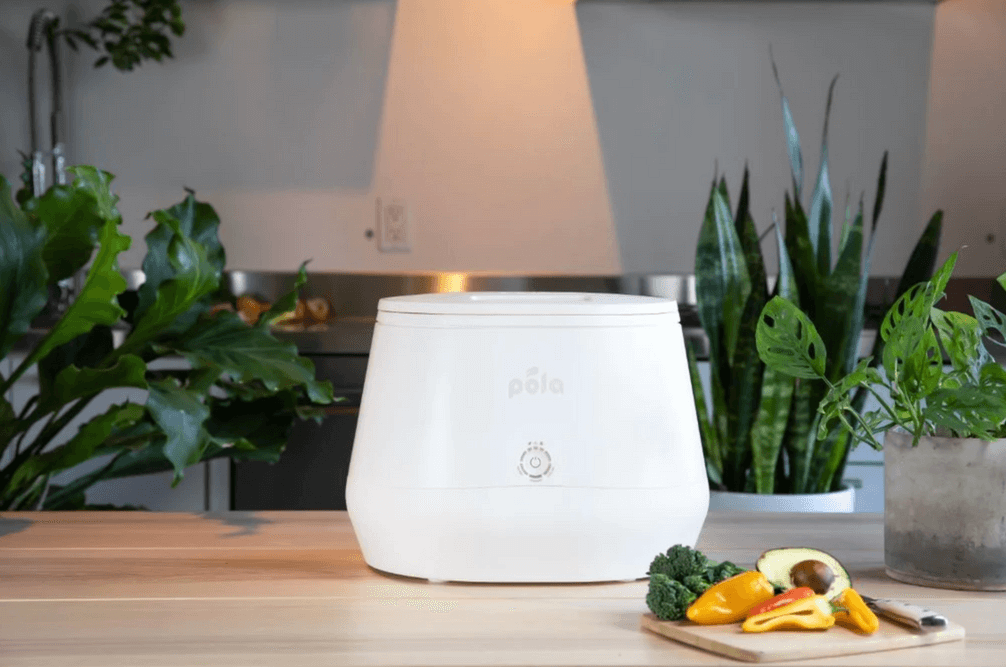Lomi is a machine used for composting. The Lomi machine breaks down food scraps using heat, abrasion, and oxygen. In the same way that worms and microbes decompose organic matter into soil, the Lomi fragments your waste into smaller, soil-like fragments without the smell, mess, or worms.
Table of Contents
What is lomi?
Lomi is an eco-friendly in-home dishwasher-safe waste reduction machine that fits on your kitchen counter and works with the push of a single button. It decomposes food waste, bioplastics, and trimmings from houseplants.
There are three modes on this countertop kitchen appliance:
- a quick cycle for breaking down waste
- a special cycle for decomposing bioplastics
- a longer cycle for creating nutrient-rich dirt that can be added directly to your garden
This countertop composter can break down most organic waste and turn it into rich compost in under 24 hours.

How does lomi work?
In as little as 3 hours, Lomi transforms organic waste into practically odorless dirt. Fertilizer is produced within 16 to 20 hours and can be used for potting plants or nourishing gardens.
Basically, the Lomi machine is used to dry and grind up whatever is placed inside it. Lomi breaks down food into smaller pieces, making it easier for microorganisms to digest.
The grinding process also helps to aerate the compost, increasing oxygen levels and providing a healthy environment for microorganisms that require oxygen to function.
| Lomi approved materials | Lomi not approved materials |
| Fruit and veggie scraps | Hard bones |
| Eggshells | Cooking oils |
| Kitchen scraps | Greasy food |
| Meat scraps | Fruit pits |
| Dairy products | Soaps |
| Baked goods | Shampoos |
| Cereals | Conditioners |
| Small, soft bones | Lined bags |
| Coffee filters & coffee grounds | Soiled diapers |
| Soiled paper products | Baby wipes |
| Compostable plastics | Cigarettes |
| Houseplant foliage from indoor plants | Metal, plastic, glass |
Does lomi use electricity?
Yes, it does use electricity, but not much.
Averaging 0.6-1.0 kWh per cycle, Lomi 1.0 uses less energy than some common kitchen appliances.
How quickly does lomi work?
The Lomi system can convert organic waste into practically odor-free dirt within three hours.
In 16 to 20 hours, it produces a rich fertilizer that can be used for potting plants and fertilizing gardens.

How do you know when lomi is done?
The Lomi machine is surprisingly quiet. There is not a lot of beeping from the Lomi. It beeps the first time you turn it on, the second time you change the settings, the third time when the cycle begins, and the fourth time when the cycle is completed.
What can you put in lomi?
Various household wastes and organic materials can be composted, including:
- Fruit & veggie scraps
- Peels
- Eggshells
- Kitchen scraps
- Meat scraps
- Dairy products
- Baked goods
- Cereals
- Plate scrapings
- Small, soft bones like fish, chicken bones from broth, etc.
- Coffee filters
- Coffee grounds
- Soiled paper products
- Compostable plastics (Lomi-approved bioplastics)
- Houseplant foliage from indoor plants
What can you not put in lomi?
In Lomi, only a few types of food scraps cannot be recycled, including:
- Hard bones (chicken, beef, pork, lamb)
- Cooking oils, grease, very greasy foods
- Fruit pits (avocados, peaches, apricots, nectarines, mango)
- Soaps, shampoo, and conditioner bars
- Lined bags (chip, cookie, pet food)
- Soiled diapers, baby wipes
- Cigarettes
- Metal, plastic, glass
Can you use lomi without LomiPods?
A Lomi Pod is only required when running a Grow or Lomi Approved cycle.
If you are adding a Lomi Pod, you should add 50mL of water.
Does lomi smell?
Unless your filters need to be changed, Lomi should not produce or emit any odors during normal and intended use.
Food scraps that have rotted or moldered never smell good, and even though the carbon filter can handle them, you may waft up some unwanted odors when you open the lid. Because of this, it is not recommended to leave food in Lomi for more than two days at a time.
A Lomi food waste recycler contains two carbon filters to reduce the odor of mixed food scraps before and during the electric composting cycle.

